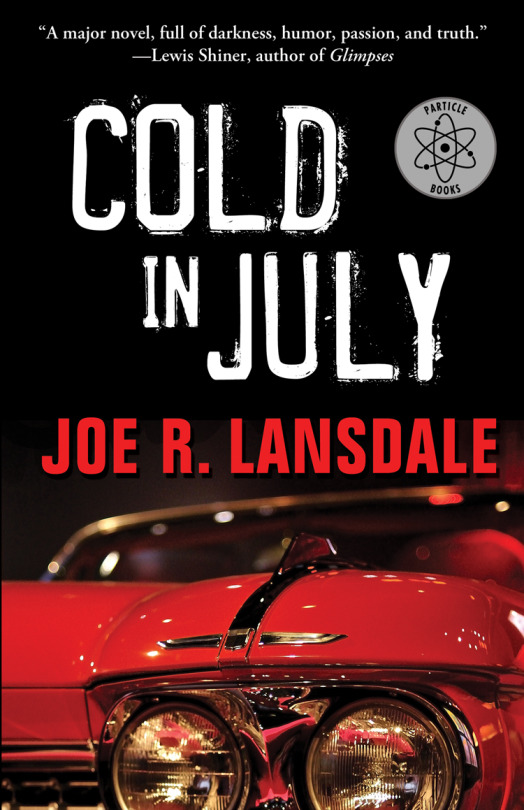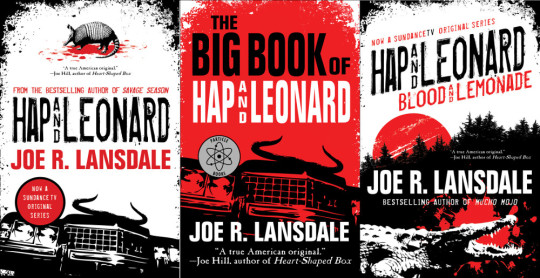With the suspenseful COLD IN JULY, Joe R. Lansdale, as always, tells a good story

TZER ISLAND praises Joe R. Lansdale’s COLD IN JULY.
COLD IN JULY is the kind of story that confronts relatively good people with hard moral choices. The story eventually gives Dane the opportunity to act as a vigilante in what seems to him (and possibly the reader) to be a just cause. Typical vigilante fiction features a resolute and self-righteous protagonist with military training and lots of guns who makes the world a better place by cleaning up the polluting people he defines as scum. Dane is just an ordinary guy. He doesn’t see himself killing anyone. Whether he will or won’t take on the vigilante role and what effect that choice will have on him is the question than builds suspense in the novel’s second half. Readers can debate whether Dane makes the right choice, which is part of the reason to read a book like COLD IN JULY. Lansdale makes clear that there really is no choice that can clearly be viewed as morally correct. Whatever Dane does will lead to harm, and any choice he makes will leave a permanent scar on his soul.
Lansdale always tells a good story and he doesn’t waste words doing it. His characters are as real as they need to be. Readers understand a character’s essential characteristics without wading through every detail of their formative years. Lansdale avoids making the villains stereotypes by largely ignoring them. We know what they did, but we don’t know them as people. Nor do we need to know them. The focus instead is on the good guys, who are flawed but far from evil, making it easy for the reader to hope for the best when the shooting starts.
COLD IN JULY builds suspense until the story reaches its bloody climax. It isn’t possible to close one’s eyes when reading a book, but readers might find themselves holding their breath. I don’t know if the movie adaptation is any good (Roger Ebert didn’t think so), but COLD IN JULY played as a thumbs up movie in my mind.
Craig Terlson on his WOOFREAKINHOO blog profiles Lansdale and his seminal creation Hap & Leonard.
About a dozen or more years ago I was working on my first novel, Correction Line, and I was swapping chapters with a friend from Rhode Island. My story was a combination of a lot of things I loved, literary fiction, the prairies, baseball, bad guys with guns, and oh yeah Marquez and other magical realists. Let’s just say I was trying to put a lot of things together.
While my friend was reading the excerpts he asked,
“Anyone ever tell you that you kinda write like Joe Lansdale?”
“Who?”

Anyway, like I said, lots has been written, including by me at this blog, on my love of all things Lansdale. At the centre of this praise are his two best, and most well-known characters, Hap and Leonard. Trying to keep this intro short, so let’s just say working class white, liberal, draft dodger Hap teams up with black, gay, conservative, Vietnam vet, Leonard and they… wait, what do they do? Solve cases? Help people? Are their own kind of knight errants? Kick a lot of ass? Well, yes to all those things. It’s kind of hard to describe. They do get into their own sort of trouble, and end up helping people because it is the right thing to do. But really, for me, it’s all about who they are—I read them just to find out what they’re up to. And the characters are so sharp and original that I’d read a story about the two of them going to the grocery store to pick up a box of Vanilla wafers for Leonard (his favourite).
<snip>
The first few chapters of Bad Chili revolve around Hap getting treatment for his possibly rabid squirrel bite. I know some editors and agents would say that the conflict has to be there right on the first page, and don’t fuck around getting there. Lansdale eventually gets there (the novel is not about rabid squirrels—but for three of four chapters it is). Because he has created such great characters, you don’t feel one ounce of impatience in the doling out of the story… or I sure didn’t. And it is a damn good story.

Photo: Ulf Anderson
KENDALL REVIEWS interviews Lansdale.
KR: What kind of research do you do, and how long do you spend researching before beginning a book?
I usually read things that interest me and they lead to my desire to write a certain story. I research when I have to, or to make sure I have something right, or at least I try to do that. But sometimes I’m reading something for fun, and that leads to my interest in writing something. I’m rarely aware I’m researching. There have certainly been things through where I felt I needed to delve deeper than the books I read that got me interested in the first place.
KR: Describe your usual writing day?
When I wake up, I get my coffee and something light to eat, and go to work. I work for about three hours, but it can be less, and now and again is more, if I decide to drop in later in the day. But three hours is usually about all I have in me everyday. I write a lot daily then I get diminishing returns. I have a plan to get three to five pages, and it is rare indeed that I don’t get that, and frequently I get more, six or seven, sometimes ten or twelve, depending. I do most of my proofing as I go, so I don’t have multiple drafts that are visible. I write the story and then do a polish, and I’m done. I’m willing to make any changes that make sense, however, and always listen to editorial suggestions, but I also feel fine ignoring them if I think I should.
The rare short story “Man With Two Lives” is the latest addition to the BookVoice Pocket Stories series.
Written around the same time as The Magic Wagon, “Man With Two Lives” catches up with an Old West legend past his prime.
An excerpt from “Man With Two Lives”
It was July the Fourth and Nacogdoches, the oldest town in Texas, was hung with banners declaring the holiday. The old man read them and continued walking. He was not in a festive mood at all. It was too hot and he was too old. He continued around the square toward the general store.
Yes, too hot and too old, but he kept going full steam ahead, for this was how he had always lived, and he knew no other way.
Sometimes, especially when it was hot he had noticed, he thought perhaps it would have been better had he really died in that saloon facedown on the card table; really been buried in a good hard box in that dark, rocky ground.
Certainly it would have been better than this. Less painful than this; wasting away of old age, being a man out of place and time, a nobody. Considering the fact that in his first life he had been very important made this all the worse.
Once he had carried a brace of revolvers, but now it was all he could do to carry himself down the street.
CAMPFIRE RADIO THEATER presents the audio adaptation of Lansdale terrifying short story “God of the Razor.”
A man investigates an old Texas mansion searching for antiques but soon finds more than he bargained for. Because in this lonely stretch of land, ancient gods walk the earth and their followers have little choice but to obey their twisted demands
For more info about COLD IN JULY, visit the Tachyon page.
Cover design by Elizabeth Story
For more info about HAP AND LEONARD, visit the Tachyon page.
For more info about THE BIG BOOK OF HAP AND LEONARD, visit the Tachyon page.
For more info about HAP AND LEONARD: BLOOD AND LEMONADE, visit the Tachyon page.
Covers by Elizabeth Story
